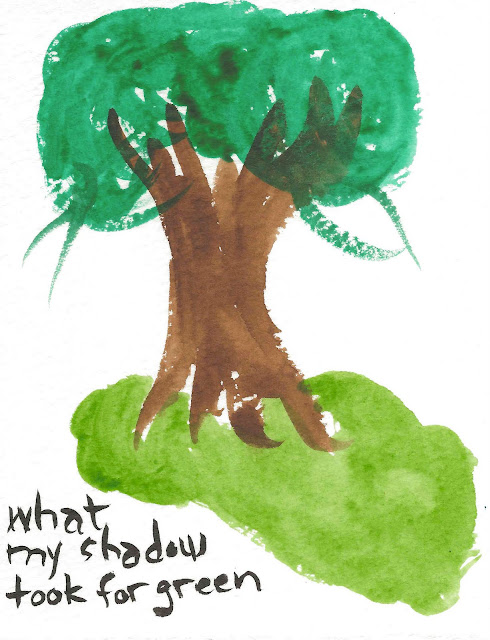40. raspberryblossoming
To pick a raspberry, we
fall to our knees, to give thanks,
to divulge praise to the moist earth beneath
dry earth, to sun, to intermittent
rain and bees that visit the temporary blossoms
of the thorny canes—to see, from below (human
miniaturized by shade) the berries hidden by green
leaves in a canopy of storeys and shifting light, where
fruits of purpled black, red-purple, red, rose,
white or variegated in white and pink, with drupelets
rowed to remind of kernels on corn, evidence of summer,
when the fragments of nature divide themselves to
multiply into what we see as profusion, even though
not every berry is seen from an air of walking,
the least or greatest maybe slipping beneath
cover, the fruit reserved for neither bird
nor human, but earth, to mix with seed
and stick and leaves falling from an autumn lasting
until past the winter when seed cracks,
sprouts, sends up a beacon, message,
measure of a making without even promise
for harvest.
But it is all
nothing
but words.
You see
them and make them
seen. How a word is read because
a word is seen (not the sound of it
but), the form it takes for the eye. You
crack open the O to find the eye
within it. Every letter is a sculpture
that makes sense only through
dismantlement. You write, you work
with ink, you are a thinkink man.
Your pen is camera or pen, your
paper is paper, and you work the word
to find the word. You might cut
it back and use it
in a ntence. You might study
its sytructure, adding something
as you did. You might find
something beautrifulo in it,
because our language is
not simply aural. We speak in
a visual language, tongueless,
tongueless all the days, reading
the shapes and sounds of words
into our heads. Language as
the work of eyes
and hands,
earless, mouthless,
prone to
silence.
In these woods I’ve made myself to today,
fruits are small: twinberry’s red made silent
by profusion of its rounded green leaves, blueberry
bushes not as tall as a knee with fruit
smaller than a kernel of corn, and blackberry
in place of raspberry and those fruit still hard
and green and tiny as a drop of ink. Here
there is no harvest and just enough heat
to keep the woods growing (hemlock
beech, birch, oak). Here we don’t
have to drop to our knees
to find the fruit. This
is a place of the words
we hear, and a chorus of
bullfrogs, guttural, droning,
sing to us now, right
now, to let us know
that night, pure night,
lit by no lamp,
does not allow
for silent words.
In this dark place,
we use
our
ears.
fall to our knees, to give thanks,
to divulge praise to the moist earth beneath
dry earth, to sun, to intermittent
rain and bees that visit the temporary blossoms
of the thorny canes—to see, from below (human
miniaturized by shade) the berries hidden by green
leaves in a canopy of storeys and shifting light, where
fruits of purpled black, red-purple, red, rose,
white or variegated in white and pink, with drupelets
rowed to remind of kernels on corn, evidence of summer,
when the fragments of nature divide themselves to
multiply into what we see as profusion, even though
not every berry is seen from an air of walking,
the least or greatest maybe slipping beneath
cover, the fruit reserved for neither bird
nor human, but earth, to mix with seed
and stick and leaves falling from an autumn lasting
until past the winter when seed cracks,
sprouts, sends up a beacon, message,
measure of a making without even promise
for harvest.
But it is all
nothing
but words.
You see
them and make them
seen. How a word is read because
a word is seen (not the sound of it
but), the form it takes for the eye. You
crack open the O to find the eye
within it. Every letter is a sculpture
that makes sense only through
dismantlement. You write, you work
with ink, you are a thinkink man.
Your pen is camera or pen, your
paper is paper, and you work the word
to find the word. You might cut
it back and use it
in a ntence. You might study
its sytructure, adding something
as you did. You might find
something beautrifulo in it,
because our language is
not simply aural. We speak in
a visual language, tongueless,
tongueless all the days, reading
the shapes and sounds of words
into our heads. Language as
the work of eyes
and hands,
earless, mouthless,
prone to
silence.
In these woods I’ve made myself to today,
fruits are small: twinberry’s red made silent
by profusion of its rounded green leaves, blueberry
bushes not as tall as a knee with fruit
smaller than a kernel of corn, and blackberry
in place of raspberry and those fruit still hard
and green and tiny as a drop of ink. Here
there is no harvest and just enough heat
to keep the woods growing (hemlock
beech, birch, oak). Here we don’t
have to drop to our knees
to find the fruit. This
is a place of the words
we hear, and a chorus of
bullfrogs, guttural, droning,
sing to us now, right
now, to let us know
that night, pure night,
lit by no lamp,
does not allow
for silent words.
In this dark place,
we use
our
ears.


Comments
Post a Comment